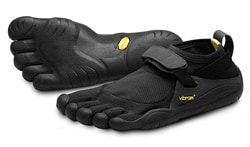
Athletic shoes are making headlines again for bogus claims that have left wearers injured. This time, a lawsuit alleges that so-called “Barefoot” running shoe claims are false. New Yorker, Joseph Rocco, just filed a lawsuit against a unit of Adidas AG, said Reuters. He claims he was deceived by the athletic shoemaker concerning the possible […]
 Athletic shoes are making headlines again for bogus claims that have left wearers injured. This time, a lawsuit alleges that so-called “Barefoot” running shoe claims are false.
Athletic shoes are making headlines again for bogus claims that have left wearers injured. This time, a lawsuit alleges that so-called “Barefoot” running shoe claims are false.
New Yorker, Joseph Rocco, just filed a lawsuit against a unit of Adidas AG, said Reuters. He claims he was deceived by the athletic shoemaker concerning the possible fitness benefits of shoes meant to mimic running barefoot. The class action lawsuit was filed in federal court in Brooklyn, New York and Rocco said his $90 pair of adiPure shoes did not provide the promised “increased training efficiency and decreased risk of injury promised” touted in Adidas’ ads, said Reuters. The lawsuit was filed against the firm’s U.S. subsidiary, Adidas America Inc., maker of the adiPure shoes. The shoes’ launch followed the so-called “barefoot running” trend which involves running in shoes with “articulated toes and minimal padding,” Reuters explained.
Rocco alleges that, in contrast to Adidas’ ads, the adiPure shoes increase bruising risks and the likelihood of foot damage due to increased padding and other structural differences between the new line and traditional running shoes, said Reuters. According to Rocco, he and other consumers were not warned about the adiPure’s potential hazards and, because of this, he suffered compound fractures after training in the shoes. The lawsuit is looking to certify a class of people who bought adiPure shoes since they were first brought to market in August 2011. Rocco seeks a refund for the adiPure shoes and statutory damages, according to Reuters.
Although this is the first lawsuit known to be filed against Adidas over its marketing of adiPure, a class action lawsuit was filed this March against Vibram, which makes the barefoot-style running shoe FiveFingers. That suit was filed over claims similar to those presented in this lawsuit regarding the shoes’ unproven health benefits, said Reuters.
We’ve previously written that toning shoes, constructed with rocking soles and touted to stretch leg muscles with every step, prompted injuries, physician warnings, and lawsuits. The shoes tout the sensation of walking on the beach and are constructed with intentional instability meant to make the wearer exert more effort to stay balanced.
Toning shoes soon faced mounting criticism over injuries such as shin splints and sprained and broken ankles, and false claims, despite that some shoe makers, including Reebok, paid for studies on the shoes. The American Council on Exercise, a nonprofit fitness organization, conducted a study that found that the toning shoes did not live up to shoe maker claims. Other experts have also said the shoes are more hype than anything else. The Federal Trade Commission (FTC) became involved and Reebok, New Balance, and Sketchers have all faced lawsuits over their marketing.
Reebok was ordered to pay a whopping $25 million in customer refunds as part of an FTC settlement over accusations the athletic shoe and clothing company falsely advertised its toning shoes as significantly strengthening leg, thigh, and buttock muscles; Reebok will not be allowed to make these claims without backing up their promises with science. The FTC became involved after Reebok marketed its EasyTone footwear as being proven to increase buttock strength and tone by 28 percent and hamstring and calf muscles by 11 percent, versus regular walking shoes.
Skechers was also ordered to pay refunds to toning shoe buyers following false-advertising allegations. Touting the benefits of its Shape-Ups and other toning shoes, Skechers USA Inc. utilized celebrity endorsements making claims about the shoes’ benefits. Federal and state officials disagreed with the claims and Skechers has to pay $50 million to settle false-advertising allegations by the FTC and the attorneys general of 44 states and the District of Columbia.


